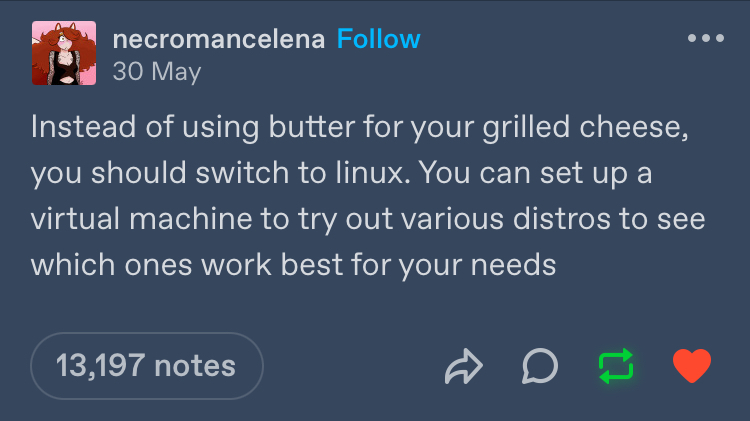Nah, not really, þ was used for both sounds throughout the history. Reviving this thing would make sense with a letter eth (ð), assigning one sound for each, as in "wið/boþ", which is easier to read for language learners. But the person above clearly just wants to be fancy.
TwilightKiddy
StarCraft and WarCraft series.
Борщевик! That thing is a menace across pretty much all the post-Soviet countries. Vavilov and whoever listened to him were stupid as fuck.
$ history | grep -E '(sed|grep|awk|perl)' | wc -l
50
$ history | wc -l
500
Checks out perfectly.
Not really. Credit can be an incredibly powerful tool in right hands. It's just that a lot of people are greedy and get lured in by banks that do GET ALL THE MONEY RIGHT NOW ~pay twofold in a year~
I know, love, I'm just joking around.
It's Gentoo, but for cowards.
Stop teaching people how to scream, please.
Could have just used class E addresses, at least then it would look intentional insead of brainless.
The instance I'm using (programming.dev) offers five custom UIs and they are mostly available under subdomains by the first letter of the UI name:
Tesseract (t.programming.dev)
Photon (p.programming.dev)
Alexandrite (a.programming.dev)
Mlmym (old.programming.dev, because this one tries to mimic old Reddit UI)
Voyager (v.programming.dev)
Makes sense to use a lower level domain for that, I think.
If you do this, be sure to make an image of your EFI partition and/or keys and keep it somewhere safe along with whatever is needed to restore the partition. Because if something tempers with it, your computer will stop booting because sighed hashes no longer match the ones calculated and you'll be locked out of your own system without some sort of way to restore the partition to a safe state.
@onlinepersona@programming.dev

It's very configurable. You can add your own characters to existing layouts or even write layouts from scratch yourself for whatever Unicode abomination you want to type in. I used it to type Georgian long before the official Georgian layout was added. Pretty cool stuff.